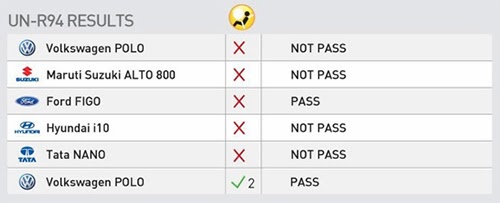VW Polo, Ford Figo, Hyundai i10 FAIL Safety Tests - Unsafe according to Global NCAP rating
Do you own a VW Polo or a Ford Figo or a Hyundai i10? If you own any these cars and feel that you and your family are safe in these vehicles, you are gravely mistaken. According to the recent Global NCAP ratings VW Polo, Ford Figo, Hyundai i10 along with Maruti Alto 800 and Tata Nano have failed crash tests and the occupants lives are in mortal danger if any of these cars are involved in major accident.
Global NCAP
is a UK based independent organization run by charity which conducts regular
safety assessments of vehicles sold all over the world to promote human and environmental
safety. The Global NCAP performs independent tests and provides financial and
technical assistance to new car assessment programmes in individual countries and often publicly declares
vehicle crash test results.
This time around
it was the turn of 5 Indian vehicles namely VW Polo, Ford Figo, Hyundai i10,
Maruti Alto 800 and Tata Nano, to undergo the stringent safety tests and the
results are a shocker for the Indian consumers. All the 5 vehicles received
zero-star ratings in adult occupant safety during head-on collisions at 64km/h.
The was the first instance of independent crash tests of some of India’s
popular small cars done by the Global NCAP. The combined sales of these five
cars account to around 20% of new car sales in India. All models of these cars
chosen were entry-level models with no airbags since none of these base models
come with airbags as standard equipment.
The overall
crash results pictured that the structures of Tata Nano, Maruti Suzuki Alto 800
and Hyundai i10 proved inadequate and collapsed to greater degree. The
structures were so weak that even if these models were fitted with an airbag
the safety ratings would hardly improved and the occupants would still received
fatal injuries. On the other hand, the structures of VW Polo and Ford Figo remained stable after
crash and the safety would improve if airbags were fitted.
With the
declaration of these results, Volkswagen has discontinued the airbag-less
variant of Polo in India. VW requested the Global NCAP organization to retest
the Polo with airbags fitted and the airbag variant of the Polo received 4-star
safety rating.
Ex-Formula
One boss and Chairman of FIA and present Chairman of Global NCAP, Max
Mosely said: “India is now a major global market and production centre for
small cars, so it’s worrying to see levels of safety that are 20 years behind
the five-star standards now common in Europe and North America. Poor structural
integrity and the absence of airbags are putting the lives of Indian consumers
at risk. They have a right to know how safe their vehicles are and to expect
the same basic levels of safety as standard as customers in other part of the
world.”
Rohit
Baluja, President of India’s Institute of Road Traffic Education (IRTE) says:
“These results show that India would benefit enormously from the introduction
of minimum crash safety standards and clearer information for consumers about
the protection new cars offer. Many cars made in India for export meet these
standards already, so it’s not a question of know-how or capability: India’s
automobile industry just needs the right incentives. With the UN’s minimum
safety standards and clear information for consumers, India can produce cars
that are every bit as good as those in Europe and the US.”
Let’s Look
as the Individual assessment reports for these 5 Indian cars
1. VW Polo
The VW Polo
structure was stable after the crash but the readings on the dummy passenger
indicated high-risk of fatal injuries the occupant is likely to suffer. The
Polo used in this test was one without the driver and passenger airbag variant.
Global NCAP quoted that if Polo with airbags is tested the Polo gets a 4-star
rating which makes it the safest car in its segment.
1. VW Polo
 |
| VW Polo base modelwithout airbags |
For safety
of child occupants the Polo received 3-star ratings if the child seats
recommended by VW are installed. In the absence of airbags, the Polo failed the
minimum safety requirements in 56km/h crash tests as prescribed by the UN
Global NCAP
organization advices the customers to carefully select the Polo variant they
want to buy.
2. Maruti Suzuki Alto 800
In the case
of the Alto 800, the structure strength was inadequate and collapsed at varying
degrees. The structure proved to be so weak that even the introduction of
airbags would not help the occupants from suffering life threatening injuries.
The Global NCAP declared the Alto 800 to
be “unsuitable for the fitmaent of airbags”.
 |
| Maruti Alto 800 base model without airbags |
Alto 800
received 2-star ratings for child protection only if the child seats recommended
by Maruti Suzuki are used. Alto 800 failed for the 56km/h UN and 64km/h NCAP
crash tests.
3. Hyundai i10
As with the
case with the Alto 800, the Hyundai i10’s structure too proved to be fragile and
collapsed in varying degrees during the crash test. Even for the i10 the presence
of airbags did not make much difference.
 |
| Hyundai i10 base model without airbags |
More shockingly
the i10 received just 1-star rating for child safety when child seats
recommended by Hyundai were used. A 3-year old dummy passenger received life
threatening injuries from the crash.
4. Ford Figo
Much like
the Polo, the Figo has a stable structure but still got zero-star rating due to
absence of airbags. In presence of airbags, the Figo is expected to be much
more safer. In the 64km/h crash tests the Figo failed to pass but was able to
meet the UN’s minimum safety requirements in the 56km/h crash test where the
driver’s head narrowly missed direct contact with the steering wheel.
 |
| Ford Figo base model without airbags |











Post a Comment